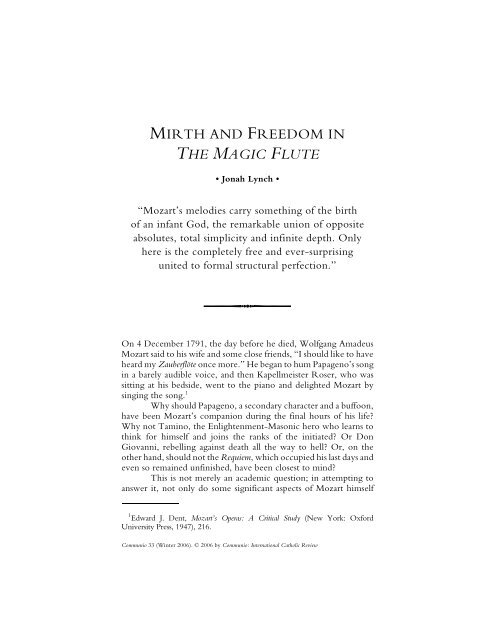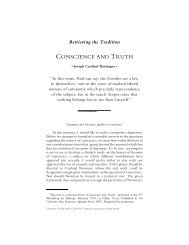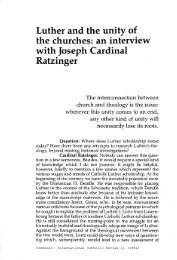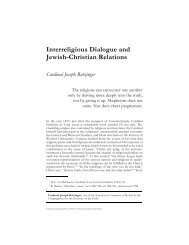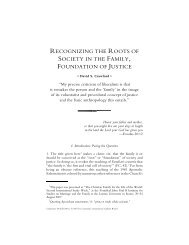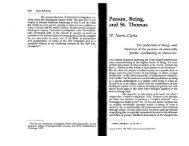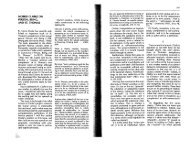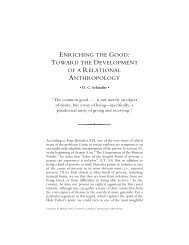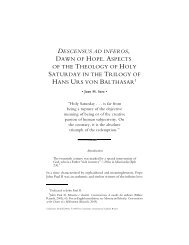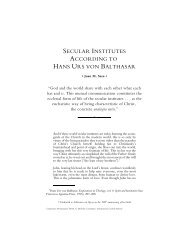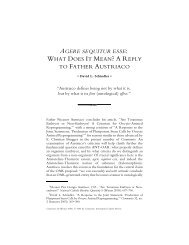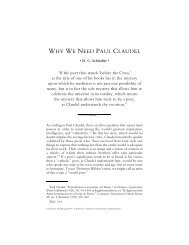Jonah Lynch. Mirth and Freedom in The Magic Flute. Communio 33 ...
Jonah Lynch. Mirth and Freedom in The Magic Flute. Communio 33 ...
Jonah Lynch. Mirth and Freedom in The Magic Flute. Communio 33 ...
Create successful ePaper yourself
Turn your PDF publications into a flip-book with our unique Google optimized e-Paper software.
MIRTH AND FREEDOM IN<br />
THE MAGIC FLUTE<br />
• <strong>Jonah</strong> <strong>Lynch</strong><br />
“Mozart’s melodies carry someth<strong>in</strong>g of the birth<br />
of an <strong>in</strong>fant God, the remarkable union of opposite<br />
absolutes, total simplicity <strong>and</strong> <strong>in</strong>f<strong>in</strong>ite depth. Only<br />
here is the completely free <strong>and</strong> ever-surpris<strong>in</strong>g<br />
united to formal structural perfection.”<br />
On 4 December 1791, the day before he died, Wolfgang Amadeus<br />
Mozart said to his wife <strong>and</strong> some close friends, “I should like to have<br />
heard my Zauberflöte once more.” He began to hum Papageno’s song<br />
<strong>in</strong> a barely audible voice, <strong>and</strong> then Kapellmeister Roser, who was<br />
sitt<strong>in</strong>g at his bedside, went to the piano <strong>and</strong> delighted Mozart by<br />
s<strong>in</strong>g<strong>in</strong>g the song. 1<br />
Why should Papageno, a secondary character <strong>and</strong> a buffoon,<br />
have been Mozart’s companion dur<strong>in</strong>g the f<strong>in</strong>al hours of his life?<br />
Why not Tam<strong>in</strong>o, the Enlightenment-Masonic hero who learns to<br />
th<strong>in</strong>k for himself <strong>and</strong> jo<strong>in</strong>s the ranks of the <strong>in</strong>itiated? Or Don<br />
Giovanni, rebell<strong>in</strong>g aga<strong>in</strong>st death all the way to hell? Or, on the<br />
other h<strong>and</strong>, should not the Requiem, which occupied his last days <strong>and</strong><br />
even so rema<strong>in</strong>ed unf<strong>in</strong>ished, have been closest to m<strong>in</strong>d?<br />
This is not merely an academic question; <strong>in</strong> attempt<strong>in</strong>g to<br />
answer it, not only do some significant aspects of Mozart himself<br />
1 Edward J. Dent, Mozart’s Operas: A Critical Study (New York: Oxford<br />
University Press, 1947), 216.<br />
<strong>Communio</strong> <strong>33</strong> (W<strong>in</strong>ter 2006). © 2006 by <strong>Communio</strong>: International Catholic Review
<strong>Mirth</strong> <strong>and</strong> <strong>Freedom</strong> <strong>in</strong> <strong>The</strong> <strong>Magic</strong> <strong>Flute</strong> 581<br />
come to light, but one can also beg<strong>in</strong> to <strong>in</strong>tuit the <strong>in</strong>version of<br />
tragedy <strong>in</strong>to comedy brought about by Christ’s redemptive death.<br />
We will first exam<strong>in</strong>e the plot of Mozart’s f<strong>in</strong>al opera together with<br />
some of the problems it raises, then make some observations about<br />
Mozart’s personality, <strong>in</strong> order to attempt a unified underst<strong>and</strong><strong>in</strong>g of<br />
both the man <strong>and</strong> his masterpiece.<br />
1. Synopsis of Die Zauberflöte<br />
<strong>The</strong> opera opens with a serpent pursu<strong>in</strong>g the young pr<strong>in</strong>ce<br />
Tam<strong>in</strong>o. As he fa<strong>in</strong>ts, three Ladies appear <strong>and</strong> kill the serpent. <strong>The</strong>y<br />
return to their Queen, <strong>and</strong> Tam<strong>in</strong>o awakes to the sound of Papageno’s<br />
entrance song. <strong>The</strong>y get to know each other, <strong>and</strong> Papageno<br />
boasts that he has bare-h<strong>and</strong>edly killed the serpent.<br />
At this, the three Ladies reappear <strong>and</strong> expla<strong>in</strong> what actually<br />
happened, while punish<strong>in</strong>g Papageno for his lie. Together with the<br />
Queen, they give Tam<strong>in</strong>o a portrait of the Queen’s daughter,<br />
Pam<strong>in</strong>a, <strong>and</strong> entrust him with rescu<strong>in</strong>g her from her abductor,<br />
Sarastro. <strong>The</strong> Ladies then offer Tam<strong>in</strong>o a magic flute, Papageno<br />
receives a music-box, <strong>and</strong> the Ladies promise that “three wise Boys”<br />
will accompany them <strong>and</strong> lead them to Sarastro.<br />
Pam<strong>in</strong>a has attempted to escape from Sarastro, but is<br />
recaptured by her overseer, the moor Monostatos, who attempts to<br />
have his way with her. At that moment, Papageno enters <strong>and</strong> is<br />
frightened by the moor’s black face, who <strong>in</strong> turn is frightened by<br />
Papageno’s extravagant appearance. Both run off, conv<strong>in</strong>ced they<br />
have each seen the devil. Papageno then <strong>in</strong>troduces himself to<br />
Pam<strong>in</strong>a <strong>and</strong> urges her to follow him to the Pr<strong>in</strong>ce.<br />
Tam<strong>in</strong>o now appears, led by the promised Boys to a grove<br />
with three temples dedicated to Reason, Nature, <strong>and</strong> Wisdom. After<br />
be<strong>in</strong>g repelled from the first two, the priest at the temple of Wisdom<br />
asks Tam<strong>in</strong>o what he seeks—<strong>and</strong>, strangely, receives not “Pam<strong>in</strong>a”<br />
but “the k<strong>in</strong>gdom of love <strong>and</strong> virtue” <strong>in</strong> response. He tells Tam<strong>in</strong>o<br />
that Pam<strong>in</strong>a is <strong>in</strong>deed there but that the Queen has given a false<br />
version of events. Once he is led to the <strong>in</strong>ner sanctum, he is told, he<br />
will underst<strong>and</strong>.<br />
Sarastro arrives, <strong>and</strong> as Pam<strong>in</strong>a expla<strong>in</strong>s her flight to him, he<br />
reveals that he knows her heart belongs to another, yet he refuses to<br />
give her freedom. Monostatos br<strong>in</strong>gs Tam<strong>in</strong>o <strong>in</strong>to the hall, where he<br />
<strong>and</strong> Pam<strong>in</strong>a recognize each other <strong>and</strong> embrace. After separat<strong>in</strong>g
582 <strong>Jonah</strong> <strong>Lynch</strong><br />
them, Sarastro orders the couple <strong>in</strong>to the temple for a trial of<br />
purification-<strong>in</strong>itiation.<br />
Act II opens with Sarastro’s presentation of Tam<strong>in</strong>o to the<br />
assembled priests. He vouches for the Pr<strong>in</strong>ce’s worth<strong>in</strong>ess, <strong>and</strong> then<br />
s<strong>in</strong>gs the remarkable “O Isis und Osiris,” a prayer for protection of<br />
the “new pair”—not, surpris<strong>in</strong>gly, Tam<strong>in</strong>o <strong>and</strong> Pam<strong>in</strong>a, but Tam<strong>in</strong>o<br />
<strong>and</strong> Papageno.<br />
<strong>The</strong> priests beg<strong>in</strong> the exam<strong>in</strong>ation, <strong>and</strong> Tam<strong>in</strong>o says that he<br />
seeks friendship <strong>and</strong> love. Papageno would prefer not to proceed,<br />
but assents to the trials when promised a pretty young wife.<br />
<strong>The</strong> Queen arrives <strong>and</strong> dem<strong>and</strong>s to know what has happened<br />
to Tam<strong>in</strong>o. Furious, she vows to disown Pam<strong>in</strong>a if she does not kill<br />
Sarastro, who then enters <strong>and</strong> reveals that he knows of the plot but<br />
will not take revenge.<br />
<strong>The</strong> purification rites cont<strong>in</strong>ue with Tam<strong>in</strong>o <strong>and</strong> Papageno<br />
exhorted to silence, which the latter largely ignores. <strong>The</strong> Boys return<br />
their <strong>in</strong>struments, offer them food, <strong>and</strong> tell them to have courage.<br />
While Papageno harps about the “div<strong>in</strong>e” food, Tam<strong>in</strong>o plays his<br />
flute. Pam<strong>in</strong>a, attracted by the sound, appears. When Tam<strong>in</strong>o refuses<br />
to speak to her, she leaves <strong>in</strong> despair. A summons sounds, <strong>and</strong> the<br />
two men leave for the temple.<br />
Papageno does not accompany Tam<strong>in</strong>o <strong>in</strong>to the temple <strong>and</strong><br />
is driven away from every door he tries. An Old Woman enters <strong>and</strong><br />
says that unless he agrees to marry her, he will rema<strong>in</strong> lost <strong>in</strong> the<br />
clefts of the earth. He promises faithfulness (until a prettier girl<br />
comes along) <strong>and</strong> she is transformed <strong>in</strong>to a lovely young woman but<br />
immediately disappears.<br />
Pam<strong>in</strong>a contemplates suicide. Just as she is about to plunge<br />
a dagger <strong>in</strong>to her breast, the three Boys restra<strong>in</strong> her <strong>and</strong> tell her to be<br />
patient, for Tam<strong>in</strong>o loves only her. As Pam<strong>in</strong>a calls to Tam<strong>in</strong>o, the<br />
Armored Men tell her that she is now worthy to accompany him,<br />
s<strong>in</strong>ce she is not afraid of death. <strong>The</strong>y recognize each other with<br />
marvelous tenderness, <strong>and</strong> then proceed victoriously through the<br />
trials of fire <strong>and</strong> water.<br />
Meanwhile, Papageno despairs of ever f<strong>in</strong>d<strong>in</strong>g his Papagena.<br />
He plays his pipes three times to call her, but to no avail. As he bids<br />
goodbye to the false world, the three Boys suddenly appear <strong>and</strong><br />
rem<strong>in</strong>d him to play his music-box. As soon as he does so, she<br />
appears.<br />
A traitorous Monostatos, the Queen, <strong>and</strong> the three Ladies<br />
appear <strong>and</strong> expla<strong>in</strong> that they wish to destroy the priests. A tremen-
<strong>Mirth</strong> <strong>and</strong> <strong>Freedom</strong> <strong>in</strong> <strong>The</strong> <strong>Magic</strong> <strong>Flute</strong> 583<br />
dous chord sounds, <strong>and</strong> Sarastro def<strong>in</strong>itively destroys their power <strong>in</strong><br />
thunder <strong>and</strong> lightn<strong>in</strong>g, plung<strong>in</strong>g them <strong>in</strong>to eternal night. “<strong>The</strong> cause<br />
of strength has triumphed, crown<strong>in</strong>g beauty <strong>and</strong> wisdom for<br />
eternity.” 2<br />
2. Shor<strong>in</strong>g up the fragments<br />
Any attempt to systematize this plot seems doomed. Every<br />
detail rem<strong>in</strong>ds one of a thous<strong>and</strong> ancient stories—the Wicked<br />
Witches <strong>and</strong> mysterious good fairies; kiss<strong>in</strong>g frogs <strong>and</strong> f<strong>in</strong>d<strong>in</strong>g pr<strong>in</strong>ces<br />
(or, <strong>in</strong> the case of Papageno, a pr<strong>in</strong>cess); heroic deeds requir<strong>in</strong>g a<br />
will<strong>in</strong>gness for unlimited sacrifice, which once accepted is richly<br />
repaid, <strong>and</strong> so on. Perhaps these fragments of connections to more<br />
well-def<strong>in</strong>ed moral stories mislead the viewer <strong>in</strong>to th<strong>in</strong>k<strong>in</strong>g he<br />
glimpses a cosmic order ly<strong>in</strong>g just out of reach—muddy<strong>in</strong>g the<br />
waters may lead some to see depth where there is only obscurity.<br />
However, we would not expect a mirage to have borne the closest<br />
scrut<strong>in</strong>y from the greatest composers <strong>and</strong> critics of the past two<br />
centuries. How else are we to make sense of the opera?<br />
<strong>The</strong>re are many <strong>in</strong>consistencies between the first <strong>and</strong> second<br />
acts: the Queen beg<strong>in</strong>s as the force of Good aga<strong>in</strong>st an Evil Sarastro,<br />
but is revealed <strong>in</strong>explicably as truly evil herself; Tam<strong>in</strong>o is “converted”<br />
to the Priests almost <strong>in</strong>stantaneously, after wholeheartedly embrac<strong>in</strong>g<br />
the Queen’s cause; Pam<strong>in</strong>a has been held aga<strong>in</strong>st her will by Sarastro,<br />
<strong>and</strong> when he realizes that she loves another he explicitly refuses to<br />
give her freedom, yet he is otherwise portrayed as a paragon of<br />
clemency, etc. Many musicologists 3 have tried to expla<strong>in</strong> this by<br />
propos<strong>in</strong>g that Mozart <strong>and</strong> his librettist simply changed their characters<br />
halfway through writ<strong>in</strong>g the opera <strong>in</strong> order to differentiate their opera<br />
from other similar works which had recently been performed <strong>in</strong><br />
2 Synopsis summarized from Peter Branscombe, W. A. Mozart—Die Zauberflöte<br />
(Cambridge: Cambridge University Press, 1991), 45–66.<br />
3 Among many others, see Myer Fredman, From Idomeneo to Die Zauberflöte<br />
(Portl<strong>and</strong>, Ore.: Sussex Academic Press, 2002), 163: “While Mozart was actually<br />
compos<strong>in</strong>g it, he <strong>and</strong> Schikaneder decided to change her [the Queen] character to<br />
become the personification of darkness, but what was already on paper was left<br />
unaltered, which is perhaps why the Queen’s entrance has a noble quality befitt<strong>in</strong>g<br />
B= major.”
584 <strong>Jonah</strong> <strong>Lynch</strong><br />
Vienna. This “lazy thesis” has been held by many em<strong>in</strong>ent musicologists,<br />
<strong>and</strong> still holds much sway today. 4<br />
Others, such as Jacques Chailley, have proposed a much<br />
more detailed read<strong>in</strong>g of the opera as essentially masonic. 5 <strong>The</strong>re is<br />
much to this read<strong>in</strong>g, <strong>and</strong> Chailley’s work is conv<strong>in</strong>c<strong>in</strong>g from many<br />
po<strong>in</strong>ts of view. For <strong>in</strong>stance, to <strong>in</strong>terpret Tam<strong>in</strong>o’s unexpected<br />
answer at the temple of Wisdom (he says he seeks the “k<strong>in</strong>gdom of<br />
love <strong>and</strong> virtue,” not Pam<strong>in</strong>a) as part of an <strong>in</strong>itiatory rite does make<br />
sense of an otherwise perplex<strong>in</strong>g declaration. However, <strong>in</strong> his<br />
attempt to read the entire work as a masonic allegory, he does not do<br />
justice to Papageno, whom he describes as a merely comic character.<br />
He would underst<strong>and</strong> Mozart’s hav<strong>in</strong>g called a “thorough Bavarian”<br />
who “made fun of everyth<strong>in</strong>g” a “Papageno” 6 as proof that the birdcatcher<br />
<strong>in</strong> the opera had no significance beyond that of a comic foil<br />
for the real drama of Tam<strong>in</strong>o’s purification. It is true that Papageno<br />
does play the buffoon, but the burden of this article will be to show<br />
that he does so <strong>in</strong> the manner of K<strong>in</strong>g Lear’s Fool: the truth-teller <strong>in</strong><br />
disguise.<br />
Chailley’s read<strong>in</strong>g is also put <strong>in</strong> doubt by the rest of what we<br />
know about Mozart’s compos<strong>in</strong>g style, <strong>and</strong> by the complete absence<br />
of any discussion of political or philosophical topics <strong>in</strong> his correspondence.<br />
Mozart wrote “absolute” music; it was neither autobiographical<br />
self-expression nor illustration of a particular idea. Peter Branscombe<br />
notes that “[i]t goes aga<strong>in</strong>st what we know about Mozart<br />
from the rest of his music to believe that his musical <strong>in</strong>vention began<br />
to be based on forces other than purely musical or dramatic ones, <strong>in</strong><br />
the way Schumann used cryptograms.” 7 It would be very strange if<br />
only once <strong>in</strong> all his work, Mozart stooped to write programmatic<br />
music. In the same way, the dearth of philosophical commentary <strong>in</strong><br />
his letters, or anyth<strong>in</strong>g other than the most banal <strong>and</strong> self-serv<strong>in</strong>g<br />
annoyance at the archbishop, tends to cast doubt upon the thesis that<br />
4<br />
Jacques Chailley, <strong>The</strong> <strong>Magic</strong> <strong>Flute</strong>, Masonic Opera (New York: Alfred A. Knopf,<br />
1971), 9.<br />
5<br />
Goethe was also of this op<strong>in</strong>ion. He wrote, “It is enough that the crowd should<br />
f<strong>in</strong>d pleasure <strong>in</strong> see<strong>in</strong>g the spectacle: at the same time, its high significance will not<br />
escape the <strong>in</strong>itiates,” cited <strong>in</strong> Branscombe, W. A. Mozart—Die Zauberflöte, 180.<br />
6<br />
Letter from Mozart to his wife at Baden, 8–9 October 1791, <strong>in</strong> Mozart’s Letters,<br />
ed. Eric Blom (Middlesex, Engl<strong>and</strong>: Pengu<strong>in</strong> Books, 1956), 263.<br />
7<br />
Branscombe, W.A. Mozart—Die Zauberflöte, 138.
<strong>Mirth</strong> <strong>and</strong> <strong>Freedom</strong> <strong>in</strong> <strong>The</strong> <strong>Magic</strong> <strong>Flute</strong> 585<br />
Mozart was mak<strong>in</strong>g surreptitious comments about overturn<strong>in</strong>g the<br />
aristocracy or speak<strong>in</strong>g primarily to the <strong>in</strong>itiated, as Goethe thought. 8<br />
F<strong>in</strong>ally, many of the symbols Chailley identifies as masonic are<br />
polyvalent: the “mystical number three” could just as well be<br />
Christian, <strong>and</strong> the conflict between light <strong>and</strong> dark has been a favorite<br />
symbol of more than solely the Enlightenment <strong>and</strong> ancient Egypt.<br />
A significant work by Ivan Nagel deals with these questions<br />
<strong>in</strong> quite different terms. Nagel sees an anti-hero <strong>in</strong> Tam<strong>in</strong>o, po<strong>in</strong>t<strong>in</strong>g<br />
out that he “speaks his most human words before he meets the priests<br />
of humanity <strong>and</strong> wisdom.” 9 Tam<strong>in</strong>o also has no solo aria <strong>in</strong> the<br />
second act, which Nagel <strong>in</strong>terprets to mean that his conversion has<br />
rendered his moral taste “thoroughly unmusical, <strong>in</strong>deed antimusical.”<br />
10 Nagel reads this conversion through the historical events<br />
that overturned aristocratic clemency (mercy) <strong>in</strong> favor of bourgeois<br />
equity (autonomy), which “loathed to owe anyth<strong>in</strong>g to the will of<br />
the gods <strong>and</strong> pr<strong>in</strong>ces <strong>and</strong> hastily obliterated all rem<strong>in</strong>ders of aid or<br />
bounty from above.” 11 He does not affirm that Mozart was necessarily<br />
tak<strong>in</strong>g sides <strong>in</strong> the upheaval of European society, but that at least<br />
subconsciously he felt that if “justice is the clemency of nations”<br />
(Pétion), the second act must merit the clemency already shown to<br />
Pam<strong>in</strong>a by Sarastro. 12 This sort of system of exchange is repulsive to<br />
Nagel, as he shows <strong>in</strong> an <strong>in</strong>terest<strong>in</strong>g passage worth quot<strong>in</strong>g <strong>in</strong> full:<br />
Happ<strong>in</strong>ess <strong>in</strong> Mozart’s buffa means ultimately only that someone’s<br />
wishes <strong>and</strong> hopes are fulfilled—<strong>and</strong> never that self-exertion is<br />
rewarded, that someone, by an act of clenched will, subdues an<br />
8<br />
Mozart was cont<strong>in</strong>ually annoyed with Archbishop Colloredo for fail<strong>in</strong>g to<br />
provide him with steady work <strong>and</strong> decent pay. This theme returns repeatedly <strong>in</strong> his<br />
letters, <strong>in</strong>dicat<strong>in</strong>g that it was not anti-clericalism or disobedience but human<br />
ambition that led to his eventual break with the archbishop.<br />
9<br />
Immediately before attempt<strong>in</strong>g to enter the first temple, Tam<strong>in</strong>o says, “My<br />
purpose is noble <strong>and</strong> pure . . . . To me, rescu<strong>in</strong>g Pam<strong>in</strong>a is a duty” (N. 8), noted<br />
<strong>in</strong> Ivan Nagel, Autonomy <strong>and</strong> Mercy. Reflections on Mozart’s Operas (Cambridge,<br />
Mass.: Harvard University Press, 1991), 78.<br />
10<br />
Ibid., 99.<br />
11<br />
Ibid., 97.<br />
12<br />
Pam<strong>in</strong>a had just been <strong>in</strong>cited by her mother to murder Sarastro; when the latter<br />
enters immediately afterward <strong>and</strong> she begs forgiveness for enterta<strong>in</strong><strong>in</strong>g such bloody<br />
thoughts, he s<strong>in</strong>gs that he already knows her thoughts, <strong>and</strong> that revenge is<br />
unknown to these sacred halls (N. 15, Aria “In diesen heil’gen Hallen”).
586 <strong>Jonah</strong> <strong>Lynch</strong><br />
<strong>in</strong>different or unfavorable outer world. First <strong>and</strong> foremost,<br />
happ<strong>in</strong>ess means that all dwell closely together <strong>in</strong> love <strong>and</strong> strife<br />
(<strong>and</strong> thus learn how rightly to wish <strong>and</strong> hope, not <strong>in</strong> solitary,<br />
terroristic yearn<strong>in</strong>g). <strong>The</strong> philist<strong>in</strong>e element of Die Zauberflöte can<br />
be measured by this scale. It lurks not so much <strong>in</strong> Tam<strong>in</strong>o’s<br />
subservience to the Order <strong>and</strong> the rules as <strong>in</strong> the delusion of<br />
abstract autonomy: that a man under alien control still takes pride<br />
<strong>in</strong> be<strong>in</strong>g sufficient to <strong>and</strong> responsible for himself. Not collectivism<br />
but petty-bourgeois <strong>in</strong>dividualism makes the German<br />
biddable, obedient to an ethics that transfigures sour drudgery<br />
<strong>in</strong>to the solipsistic ecstasies of duty <strong>and</strong> discipl<strong>in</strong>e. <strong>The</strong> happ<strong>in</strong>ess<br />
of buffa, however, is Mediterranean, not because of dreamy<br />
atmospherics but because <strong>in</strong> those regions, far away from Luther<br />
<strong>and</strong> Kant, the <strong>in</strong>dividual <strong>and</strong> society never saw themselves as<br />
opposites. 13<br />
Although he seems to have <strong>in</strong>tuited the limits of his own<br />
position, 14 Nagel proposes someth<strong>in</strong>g similar to the French Revolution’s<br />
underst<strong>and</strong><strong>in</strong>g of fraternité, which excludes hierarchy. Many<br />
other commentators have noticed this idea <strong>in</strong> a significant exchange<br />
<strong>in</strong> the opera: when Tam<strong>in</strong>o is presented to the Priests by Sarastro as<br />
a c<strong>and</strong>idate for <strong>in</strong>itiation, one of them asks, “Will Tam<strong>in</strong>o withst<strong>and</strong><br />
the harsh trials?” After Sarastro responds that he will, the second<br />
priest says, “He is a pr<strong>in</strong>ce.” At this, Sarastro corrects him: “He is a<br />
man (Mensch)!” 15 Even if it could be ma<strong>in</strong>ta<strong>in</strong>ed that Mozart had<br />
politics <strong>in</strong> m<strong>in</strong>d, which is doubtful, Nagel’s <strong>in</strong>terpretation seems<br />
reductive, as we will explore below. For example, the egalitarian<br />
<strong>in</strong>terpretation runs aground on the fact that Tam<strong>in</strong>o’s <strong>in</strong>itiation<br />
13 Nagel, Autonomy <strong>and</strong> Mercy, 35.<br />
14 It would seem that, for all his enthusiasm elsewhere <strong>in</strong> his work for a peaceful,<br />
secular order based on immanent pardon, know<strong>in</strong>g “of noth<strong>in</strong>g external to it, no<br />
god, no sovereign, no esoteric order” (Autonomy <strong>and</strong> Mercy, 34), Nagel <strong>in</strong>tuits the<br />
need for just this sort of po<strong>in</strong>t of reference (a god, a sovereign, etc.) for the<br />
<strong>in</strong>dividual <strong>and</strong> society to avoid antagonism, as he notices <strong>in</strong> the Mediterranean<br />
peoples <strong>and</strong> their happy dwell<strong>in</strong>g together <strong>in</strong> love <strong>and</strong> strife.<br />
15 N. 9a. Some have understood this to be proof that Mozart’s sympathies lay<br />
with the revolutions then occurr<strong>in</strong>g <strong>in</strong> Europe. Others, <strong>in</strong>clud<strong>in</strong>g many music<br />
directors, have explicitly <strong>in</strong>terpreted the fall of the Queen of the night to be the fall<br />
of the Catholic Church, <strong>and</strong> <strong>in</strong> one recent video record<strong>in</strong>g she <strong>and</strong> her three Ladies<br />
are represented respectively as Pope <strong>and</strong> Card<strong>in</strong>als. In the playbill for the 1947<br />
production at Covent Garden, the Queen is represented with the classic<br />
iconography of Our Lady: enthroned above a crescent, crowned with stars (see the<br />
cover of Branscombe’s book, W. A. Mozart–Die Zauberflöte).
<strong>Mirth</strong> <strong>and</strong> <strong>Freedom</strong> <strong>in</strong> <strong>The</strong> <strong>Magic</strong> <strong>Flute</strong> 587<br />
simply replaces the aristocracy of birth with that of a sort of gnostic<br />
illum<strong>in</strong>ati. 16 Surely he could not have expressed the triumph of the<br />
“<strong>in</strong>ner circle” so conv<strong>in</strong>c<strong>in</strong>gly if he were not conscious of do<strong>in</strong>g so!<br />
Further, to <strong>in</strong>terpret Die Zauberflöte’s f<strong>in</strong>ale hail<strong>in</strong>g the triumph of<br />
light (“<strong>The</strong> sun’s rays drive out the night” 17 ) as Mozart’s embrace of<br />
the Enlightenment’s belief <strong>in</strong> progress or its anti-Catholicism would<br />
be to forget his simultaneous work on the Requiem. No papal bull 18<br />
was required to conv<strong>in</strong>ce him of the reality of s<strong>in</strong>, as this last great<br />
work attests.<br />
Clearly, Die Zauberflöte cannot be reduced to a masonic<br />
program any more than it can be expla<strong>in</strong>ed away as a r<strong>and</strong>om<br />
assemblage of pieces of fairy-tales without broader significance.<br />
3. Mozart <strong>and</strong> the Church<br />
Much has been made of the tensions between Mozart <strong>and</strong><br />
the Church hierarchy as proof that he was a nom<strong>in</strong>al Catholic at<br />
best, a conclusion supposedly corroborated by his <strong>in</strong>itiation <strong>in</strong>to the<br />
masonic lodge “Zur Wohltätigkeit” <strong>in</strong> 1784. 19 In a letter a few years<br />
earlier, Wolfgang had written to his father, “laugh heartily <strong>and</strong> be<br />
16<br />
Fichte’s liberation of men from the “cha<strong>in</strong>s of the Th<strong>in</strong>g-<strong>in</strong>-itself” was<br />
supposed to mirror the French Revolution’s liberation from external cha<strong>in</strong>s, but<br />
<strong>in</strong> many cases this self-sufficiency was <strong>in</strong>terpreted as <strong>in</strong>ner freedom which could<br />
legitimately accept political oppression. “This <strong>in</strong>ner-directed idealism provides a<br />
clue to Die Zauberflöte, <strong>and</strong> shows how easily the language of metaphysical idealism<br />
could slide imperceptibly <strong>in</strong>to the poetry of <strong>in</strong>ner spiritual development <strong>and</strong><br />
transformation, <strong>and</strong> from thence <strong>in</strong>to the realms of the mysticism <strong>and</strong><br />
supernaturalism typical of early Romanticism” (Nicholas Till, Mozart <strong>and</strong> the<br />
Enlightenment. Truth, Virtue, <strong>and</strong> Beauty <strong>in</strong> Mozart’s Operas [New York: W.W.<br />
Norton & Company, Inc., 1992], 275).<br />
17<br />
N. 21.<br />
18<br />
In March 1791, as Mozart was work<strong>in</strong>g on his f<strong>in</strong>al opera, Pope Pius VI issued<br />
a brief reaffirm<strong>in</strong>g the dogma of orig<strong>in</strong>al s<strong>in</strong>.<br />
19<br />
<strong>The</strong> debate on this issue has been reignited by a recent <strong>in</strong>terview with<br />
Christoph Card<strong>in</strong>al Schönborn of Vienna, quoted <strong>in</strong> Avvenire, 19 July 2006<br />
(accessed 7 August 2006 from http://www.disal.it/Objects/Pag<strong>in</strong>a.asp?ID=5063).<br />
<strong>The</strong> card<strong>in</strong>al affirmed that Mozart’s “oft-mentioned belong<strong>in</strong>g to the Masons is<br />
unfounded.” While it seems beyond doubt that Mozart was <strong>in</strong> fact <strong>in</strong>ducted <strong>in</strong>to<br />
the lodge <strong>in</strong> 1784, the card<strong>in</strong>al is correct <strong>in</strong> affirm<strong>in</strong>g that Mozart’s faith is<br />
<strong>in</strong>dubitable <strong>and</strong> that his music is a testament to that faith.
588 <strong>Jonah</strong> <strong>Lynch</strong><br />
merry <strong>and</strong> always remember, as we do, that our Mufti H.C.<br />
[Archbishop Hieronymus Colloredo] is an idiot, but that God is<br />
compassionate, merciful, <strong>and</strong> lov<strong>in</strong>g.” 20 Alone, this quote might<br />
seem to <strong>in</strong>dicate a deist disda<strong>in</strong>ful of organized religion, but a year<br />
later, he wrote aga<strong>in</strong> to his father from Paris, say<strong>in</strong>g that on the night<br />
of his first symphony performance there, “I prayed God that it might<br />
go well, for it is all to His greater honor <strong>and</strong> glory; <strong>and</strong> behold—the<br />
symphony began. […] I was so happy that as soon as the symphony<br />
was over, I went off to the Palais Royal, where I had a large ice, said<br />
the Rosary as I had vowed to do—<strong>and</strong> went home . . . .” 21 This was<br />
not an isolated event. His faith <strong>in</strong>formed his life <strong>in</strong> every significant<br />
aspect: <strong>in</strong> 1781, he defended his honor, aga<strong>in</strong> to his father, regard<strong>in</strong>g<br />
his desire to marry Constanze, say<strong>in</strong>g, “<strong>The</strong> voice of nature speaks<br />
as loud <strong>in</strong> me as <strong>in</strong> others, louder, perhaps, than <strong>in</strong> many a big strong<br />
lout of a fellow. I simply cannot live as most young men do these<br />
days. In the first place, I have too much religion; <strong>in</strong> the second place,<br />
I have too great a love of my neighbor <strong>and</strong> too high a feel<strong>in</strong>g of<br />
honor to seduce an <strong>in</strong>nocent girl . . . .” 22 He later vowed to write<br />
the C m<strong>in</strong>or Mass <strong>in</strong> thanksgiv<strong>in</strong>g for marry<strong>in</strong>g Constanze.<br />
It would be reductive, then, to label Mozart either a radical<br />
dissenter or an unth<strong>in</strong>k<strong>in</strong>g follower. He was clearly able to be<br />
annoyed with God’s servants without rebell<strong>in</strong>g aga<strong>in</strong>st his Church,<br />
<strong>and</strong> it is <strong>in</strong>structive that <strong>in</strong> Enlightenment Paris he would forego<br />
triumphal celebration of his symphony’s success <strong>in</strong> favor of pray<strong>in</strong>g<br />
the rosary! It is also worth not<strong>in</strong>g <strong>in</strong> pass<strong>in</strong>g that nearly every letter he<br />
wrote to his Freemason brothers is a th<strong>in</strong>ly veiled request for money:<br />
it is not impossible that his cont<strong>in</strong>ued participation <strong>in</strong> the lodge was<br />
motivated by his dire f<strong>in</strong>ancial need. F<strong>in</strong>ally, he did not believe<br />
himself forced to choose between the Church <strong>and</strong> Freemasonry:<br />
although Clement XII had condemned the fraternal order <strong>in</strong> 1738,<br />
this bull was not promulgated <strong>in</strong> Austria due to opposition from<br />
Joseph II <strong>in</strong> order to protect the many highly placed personalities,<br />
<strong>in</strong>clud<strong>in</strong>g ecclesiastics, who would have been thus excommunicated. 23<br />
20<br />
Blom, Mozart’s Letters, 37.<br />
21<br />
Ibid., 107–108.<br />
22<br />
Ibid., 185.<br />
23<br />
<strong>The</strong> tim<strong>in</strong>g poses a problem, s<strong>in</strong>ce Joseph II was not <strong>in</strong> power until 1765, <strong>and</strong><br />
his mother Maria <strong>The</strong>resia was hostile to the Masons. See Chailley, <strong>The</strong> <strong>Magic</strong> <strong>Flute</strong>,<br />
Masonic Opera, 60.
<strong>Mirth</strong> <strong>and</strong> <strong>Freedom</strong> <strong>in</strong> <strong>The</strong> <strong>Magic</strong> <strong>Flute</strong> 589<br />
<strong>The</strong> portrait that emerges from these facts has been most<br />
clearly described <strong>and</strong> expla<strong>in</strong>ed by the Christian theologians who<br />
have written about Mozart. In 1956, the bicentennial of Mozart’s<br />
birth, Karl Barth offered a few concise <strong>in</strong>sights <strong>in</strong> a public lecture:<br />
“What he translated <strong>in</strong>to music was real life <strong>in</strong> all its discord.” 24 This<br />
idea is specified <strong>in</strong> an important way by another sentence: “What<br />
occurs <strong>in</strong> Mozart is rather a glorious upsett<strong>in</strong>g of the balance, a<br />
turn<strong>in</strong>g <strong>in</strong> which the light rises <strong>and</strong> the shadows fall, though without<br />
disappear<strong>in</strong>g, <strong>in</strong> which joy overtakes sorrow without ext<strong>in</strong>guish<strong>in</strong>g<br />
it, <strong>in</strong> which the Yea r<strong>in</strong>gs louder than the ever-present Nay.” 25 Barth<br />
saw that Mozart censored noth<strong>in</strong>g. He omitted none of the apparently<br />
contradictory details of life—<strong>and</strong> that this universality was<br />
possible precisely because he was certa<strong>in</strong> of the victory of the “Yes”<br />
over the “No.” Luigi Giussani, <strong>in</strong> contrast<strong>in</strong>g the fear of the<br />
unknown with the certa<strong>in</strong>ty of faith, meant someth<strong>in</strong>g similar when<br />
he wrote, “With his h<strong>and</strong> <strong>in</strong> his mother’s, the child will go <strong>in</strong>to any<br />
unlit room <strong>in</strong> the world.” 26<br />
Mozart was this sort of child. One of his greatest joys was to<br />
“play” (literally) at the piano: to improvise for a few friends, often<br />
for hours at a time. 27 Play<strong>in</strong>g, however, requires tranquil certa<strong>in</strong>ty:<br />
a frightened child will not play. <strong>The</strong> experience of musical improvisation<br />
is also closely l<strong>in</strong>ked to a sense of freedom—an overly critical<br />
audience can block a musician as much as a lack of technical<br />
preparation can. This idea can be extended to <strong>in</strong>clude the “tranquil<br />
certa<strong>in</strong>ty” <strong>and</strong> freedom of true faith <strong>in</strong> a good, lov<strong>in</strong>g, omnipotent<br />
God. With that sort of faith, difficulties do not disappear, but they<br />
are seen as ultimately less powerful than the goodness that conquers<br />
all. If Christ is truly risen, there can no longer be real despair.<br />
Although sadness <strong>and</strong> suffer<strong>in</strong>g rema<strong>in</strong>, <strong>in</strong> a mysterious way, the<br />
prayer for peace has already been answered.<br />
Barth was somewhat apologetic for the one phrase <strong>in</strong> a letter<br />
by Mozart which criticized the Protestants for hav<strong>in</strong>g their religion<br />
24<br />
Karl Barth, Wolfgang Amadeus Mozart (Gr<strong>and</strong> Rapids, Mich.: Wm. B. Eerdmans<br />
Publish<strong>in</strong>g Co., 1986), <strong>33</strong>.<br />
25<br />
Ibid., 55.<br />
26<br />
Luigi Giussani, <strong>The</strong> Religious Sense (Montreal: McGill-Queen’s University Press,<br />
1997), 130.<br />
27<br />
In this respect, Peter Schaffer’s film Amadeus is quite accurate.
590 <strong>Jonah</strong> <strong>Lynch</strong><br />
“too much <strong>in</strong> their heads.” 28 This po<strong>in</strong>t was later taken up by Hans<br />
Küng, who sought to po<strong>in</strong>t out the specifically Catholic aspect of the<br />
composer:<br />
It is a belief <strong>in</strong> God, his providence <strong>and</strong> eternal life, which for<br />
Mozart need not constantly be striven for <strong>in</strong> a strictly Lutheran<br />
way, <strong>in</strong> a constant struggle with your conscience or through<br />
pangs of conscience. Indeed, it is a belief relatively immune even<br />
to modern criticism of religion, while at the same time be<strong>in</strong>g<br />
quite compatible with a religious scorn for clergy <strong>and</strong> <strong>in</strong> the long<br />
run even with humanistic masonic ideals. All <strong>in</strong> all, it is a good<br />
Catholic assurance beyond all optimism <strong>and</strong> pessimism. 29<br />
While his words may be too ambiguous, Küng seems to be<br />
<strong>in</strong>dicat<strong>in</strong>g the childlike, simple faith that does characterize Mozart’s<br />
letters <strong>and</strong> his religious music with the phrase “good Catholic<br />
assurance.” In his “Tribute to Mozart,” Hans Urs von Balthasar said<br />
substantially the same th<strong>in</strong>g. He wrote, “Mozart serves by mak<strong>in</strong>g<br />
audible the triumphal hymn of a prelapsarian <strong>and</strong> resurrected<br />
creation, <strong>in</strong> which suffer<strong>in</strong>g <strong>and</strong> guilt are not presented as fa<strong>in</strong>t<br />
memory, as past, but as conquered, absolved, transfigured present.” 30<br />
Not only is faith the source of a quiet certa<strong>in</strong>ty, which might yet<br />
relegate suffer<strong>in</strong>g to the past <strong>and</strong> thus r<strong>in</strong>g false <strong>in</strong> the end: it presents<br />
the negative as present <strong>and</strong> transfigured.<br />
Another passage from the Swiss theologian, a commentary<br />
on the farewell trio 31 between Pam<strong>in</strong>a, Tam<strong>in</strong>o, <strong>and</strong> Sarastro,<br />
provides further <strong>in</strong>sight <strong>in</strong>to the same mystery:<br />
This earthly drama is not justified or reevaluated <strong>in</strong> that other<br />
sphere only at a subsequent stage, nor is it broken down <strong>in</strong>to a<br />
transitory chaff <strong>and</strong> an eternal kernel, which alone would be<br />
gathered <strong>in</strong>to the heavenly barns: rather, what is earthly always<br />
takes place from the very outset, without any abbreviation, <strong>in</strong> the<br />
medium of what lies beyond the earthly <strong>and</strong> makes a space for it.<br />
28 Barth, Wolfgang Amadeus Mozart, 26.<br />
29 Hans Küng, Mozart: Traces of Transcendence (Gr<strong>and</strong> Rapids, Mich.: Wm. B.<br />
Eerdmans Publish<strong>in</strong>g Co., 1993), 26.<br />
30 Hans Urs von Balthasar, “Tribute to Mozart,” <strong>Communio</strong>: International Catholic<br />
Review 28, no. 2 (Summer 2001): 399.<br />
31 N. 19.
<strong>Mirth</strong> <strong>and</strong> <strong>Freedom</strong> <strong>in</strong> <strong>The</strong> <strong>Magic</strong> <strong>Flute</strong> 591<br />
<strong>The</strong>re is no transposition: the world is <strong>in</strong> the sphere of redemption,<br />
<strong>and</strong> earth is <strong>in</strong> heaven <strong>in</strong> its true <strong>and</strong> authentic position. 32<br />
<strong>The</strong> flesh is not a mere excuse for stag<strong>in</strong>g a drama that occurs<br />
<strong>in</strong> truth only elsewhere. Mozart marvelously expresses this <strong>in</strong> his<br />
brief but dense trio. In Balthasar’s <strong>in</strong>terpretation, the complex<br />
<strong>in</strong>terplay of sacrifice for love <strong>and</strong> for an ideal, depart<strong>in</strong>g <strong>and</strong><br />
rema<strong>in</strong><strong>in</strong>g, mystery, obedience, <strong>and</strong> joy co-exist simultaneously <strong>in</strong><br />
the web of relationships between the three characters. It is <strong>in</strong>terest<strong>in</strong>g<br />
that he did not try to extend his beautiful read<strong>in</strong>g of this trio to<br />
a more global underst<strong>and</strong><strong>in</strong>g of the opera, <strong>and</strong> <strong>in</strong>deed it is hard to<br />
imag<strong>in</strong>e how he could have done so. He expla<strong>in</strong>ed that<br />
[i]t is clear that part of the perfection of “<strong>The</strong> <strong>Magic</strong> <strong>Flute</strong>” is the<br />
<strong>in</strong>credible variety of the characters, scenes, <strong>and</strong> musical forms, the<br />
lofty <strong>and</strong> lowly, the tragic, heroic, burlesque <strong>and</strong> idyllic, pathos<br />
<strong>and</strong> the stolidly down-to-earth, profundity <strong>and</strong> absurdity: “il faut<br />
de tout pour faire un monde.” If a composer like God creates the<br />
opera of our world <strong>and</strong> puts the crucified <strong>and</strong> risen Son at its<br />
center, there must be no faultf<strong>in</strong>d<strong>in</strong>g <strong>and</strong> wonder<strong>in</strong>g if he could<br />
not have made it better. <strong>33</strong><br />
Perhaps it is precisely the immediacy of this carnal, particular<br />
present <strong>in</strong> all its variety that makes for both the universality of<br />
Mozart’s work <strong>and</strong> its resistance to systematization. In any case, if<br />
32 Hans Urs von Balthasar, Explorations <strong>in</strong> <strong>The</strong>ology, vol. 3: Creator Spirit (San<br />
Francisco: Ignatius Press, 1993), 529.<br />
<strong>33</strong> Hans Urs von Balthasar, <strong>The</strong>o-Drama, vol. 2: <strong>The</strong> Dramatis Personae: Man <strong>in</strong> God<br />
(San Francisco: Ignatius Press, 1990), 269. A similar read<strong>in</strong>g, with some important<br />
extensions, can be found <strong>in</strong> D. C. Sch<strong>in</strong>dler’s recent book Hans Urs von Balthasar<br />
<strong>and</strong> the Dramatic Structure of Truth (New York: Fordham University Press, 2004), 92.<br />
He writes, “It is Tam<strong>in</strong>o’s action that therefore br<strong>in</strong>gs about his own selfactualization,<br />
by ‘saturat<strong>in</strong>g’ his ‘general’ universality <strong>and</strong> at the same time<br />
‘universaliz<strong>in</strong>g’ his <strong>in</strong>dividuality concretely by actualiz<strong>in</strong>g the order of the<br />
‘community’ <strong>in</strong>to which he is <strong>in</strong>serted. If we were to ask what <strong>in</strong> particular <strong>in</strong> this<br />
gather<strong>in</strong>g of elements represents the div<strong>in</strong>e idea, we would have to say it is the<br />
whole <strong>Magic</strong> <strong>Flute</strong>. And to see the full scope of this underst<strong>and</strong><strong>in</strong>g of ideas, we<br />
would have to see that this example from Mozart’s opera illum<strong>in</strong>ates not just<br />
human life <strong>and</strong> human activity, but <strong>in</strong> fact whatever is brought <strong>in</strong>to existence by<br />
God’s creative know<strong>in</strong>g, which is every exist<strong>in</strong>g th<strong>in</strong>g <strong>in</strong> the world. In a manner<br />
analogous to what unfolds <strong>in</strong> the plot of <strong>The</strong> <strong>Magic</strong> <strong>Flute</strong>, everyth<strong>in</strong>g that exists f<strong>in</strong>ds<br />
the irreducibly different aspects of its be<strong>in</strong>g brought <strong>in</strong>to unity <strong>in</strong> action.”
592 <strong>Jonah</strong> <strong>Lynch</strong><br />
God is “ever greater” than the images that can be made of him, his<br />
work, too, must conta<strong>in</strong> unfathomable depths.<br />
34 N. 2.<br />
4. Hero <strong>and</strong> buffoon, merit <strong>and</strong> gift<br />
Let us return to the characters, then, <strong>and</strong> see if there are any<br />
clues to the question that prompted this study. One element that<br />
immediately appears as significant is the relationship between the<br />
protagonists <strong>and</strong> time. Papageno is a “child of nature,” ever seek<strong>in</strong>g<br />
<strong>in</strong>stant gratification, unwill<strong>in</strong>g to accept any sacrifice except when<br />
confronted with present suffer<strong>in</strong>g which exceeds that required by the<br />
sacrifice (for <strong>in</strong>stance, he leaves a delicious meal only when Sarastro’s<br />
lions arrive; he promises faithfulness to an old hag only when<br />
threatened with “damnation”). He lives <strong>in</strong> the present, <strong>and</strong> <strong>in</strong> the<br />
first l<strong>in</strong>e of his open<strong>in</strong>g aria (the one Mozart wanted to hear before<br />
he died) he says he is always joyful. He is quite will<strong>in</strong>g to accept<br />
everyth<strong>in</strong>g as gift, <strong>and</strong> regards all the talk about “be<strong>in</strong>g a man” as<br />
unnecessary <strong>and</strong> unattractive. Without doubt, his shortsightedness is<br />
a limitation of his character. A man who expla<strong>in</strong>s that he lives “by<br />
eat<strong>in</strong>g <strong>and</strong> dr<strong>in</strong>k<strong>in</strong>g” 34 <strong>and</strong> who aspires to noth<strong>in</strong>g more than<br />
catch<strong>in</strong>g a pretty maid <strong>and</strong> populat<strong>in</strong>g the world with little Papagenos<br />
<strong>and</strong> Papagenas could not be taken as a model of humanity. Or<br />
could he?<br />
Tam<strong>in</strong>o, on the other h<strong>and</strong>, cedes only once to the desire for<br />
immediate satisfaction. When he first recognizes Pam<strong>in</strong>a, he rushes<br />
<strong>in</strong>to her arms, only to be separated from her at once by Sarastro. Yet<br />
neither the arduous task he (nobly or hastily?) accepts from the<br />
Queen nor the trials of <strong>in</strong>itiation pose any difficulty for his obedient,<br />
ardent spirit. For him, the future is the locus of fulfillment <strong>and</strong> the<br />
present is illum<strong>in</strong>ated by its promise. He is unwill<strong>in</strong>g to accept<br />
fulfillment as a gift: it must be earned through faithful obedience to<br />
the priests <strong>and</strong> Sarastro. This strikes one as noble, but what if<br />
fulfillment were necessarily to be an unmerited gift? Could his<br />
gracious self-gift of the <strong>in</strong>itial scenes actually have become violent<br />
self-affirmation by the end of his <strong>in</strong>itiation rite? What are we to<br />
make of his lack of faithfulness <strong>in</strong> his abrupt conversion to the Priests<br />
<strong>in</strong>stead of the Queen? Is it ultimately a crass calculation, obedience
<strong>Mirth</strong> <strong>and</strong> <strong>Freedom</strong> <strong>in</strong> <strong>The</strong> <strong>Magic</strong> <strong>Flute</strong> 593<br />
to the highest bidder? <strong>The</strong>se are questions, not affirmations,<br />
suggestive of further significance below the surface of the action.<br />
With a second look, we notice that there is a different sort<br />
of duplicity <strong>in</strong> the buffoon Papageno, which can be seen particularly<br />
clearly <strong>in</strong> the scene mentioned above. When Sarastro’s lions arrive<br />
to rouse him from his food, he cries out for help. 35 Someth<strong>in</strong>g r<strong>in</strong>gs<br />
very true <strong>in</strong> that brief <strong>in</strong>stant: he has been enjoy<strong>in</strong>g his meal to the<br />
po<strong>in</strong>t that he ignores the Priests’ summons, boast<strong>in</strong>g that he would<br />
not leave eat<strong>in</strong>g even if the lions came to fetch him. Of course, once<br />
they do come, he cries out to Tam<strong>in</strong>o <strong>in</strong> fear, who plays his magic<br />
flute to calm the beasts, <strong>and</strong> the reluctant Papageno follows him<br />
offstage.<br />
Because this <strong>and</strong> other scenes make us laugh, we th<strong>in</strong>k<br />
Tam<strong>in</strong>o is obviously the more important character. Seriousness <strong>and</strong><br />
tragedy strike the contemporary sensibility as vastly more important<br />
than humor <strong>and</strong> comedy, <strong>in</strong> the same way that ugl<strong>in</strong>ess has come to<br />
seem more valuable than beauty. 36 Yet <strong>in</strong> all its frivolity, the scene<br />
describes an exquisitely human lack of foresight, va<strong>in</strong> boast<strong>in</strong>g, <strong>and</strong><br />
desperate prayer for salvation from disaster. While it is easy to pass<br />
over this last aspect as hypocritical, someth<strong>in</strong>g similar to the way that<br />
the confession of recurr<strong>in</strong>g s<strong>in</strong>s can feel like an abuse of God’s<br />
mercy, precisely the act of ask<strong>in</strong>g for help affirms the authentic status<br />
of the human as a created be<strong>in</strong>g <strong>in</strong> need of redemption. Perhaps this<br />
seem<strong>in</strong>g duplicity is not due to the artificial divide between <strong>in</strong>tention<br />
<strong>and</strong> outcome (as it might be <strong>in</strong> a Tam<strong>in</strong>o-Freemason: the road<br />
to hell paved with good <strong>in</strong>tentions) but rather derives from the<br />
35 <strong>The</strong> entire action of the opera derives from Tam<strong>in</strong>o’s cry for help when<br />
attacked by the serpent, but his <strong>in</strong>itial need<strong>in</strong>ess soon gives way to the selfaffirmation<br />
of the hero <strong>and</strong> then of the <strong>in</strong>itiate. <strong>The</strong> opera is certa<strong>in</strong>ly too complex<br />
<strong>and</strong> perhaps too ambiguous to admit of a s<strong>in</strong>gle correct <strong>in</strong>terpretation, <strong>and</strong> the<br />
<strong>in</strong>tention here is not to sl<strong>and</strong>er Tam<strong>in</strong>o. It does seem correct, however, to affirm<br />
that Papageno’s cry for help is <strong>in</strong> cont<strong>in</strong>uity with the rest of his character, whereas<br />
Tam<strong>in</strong>o’s cry is an exception.<br />
36 Dietrich von Hildebr<strong>and</strong> made a penetrat<strong>in</strong>g comment when he wrote: “We<br />
live <strong>in</strong> a time that is <strong>in</strong> danger of suspect<strong>in</strong>g everyth<strong>in</strong>g beautiful of be<strong>in</strong>g<br />
sacchar<strong>in</strong>e <strong>and</strong> pathetically superficial, a time that promotes a cult of ugl<strong>in</strong>ess,<br />
consider<strong>in</strong>g ugl<strong>in</strong>ess to be deeper than harmony <strong>and</strong> harmony as someth<strong>in</strong>g cheap<br />
<strong>and</strong> bor<strong>in</strong>g.” <strong>The</strong> rest of the article provides a wealth of <strong>in</strong>sights <strong>in</strong>to the state of<br />
contemporary music, which risks affirm<strong>in</strong>g “orig<strong>in</strong>ality at any cost” <strong>and</strong> often<br />
speaks an “Esperanto of atonality.” See “Wolfgang Amadeus Mozart (1962),”<br />
Logos: A Journal of Catholic Thought <strong>and</strong> Culture 7, no. 2 (2004): 205.
594 <strong>Jonah</strong> <strong>Lynch</strong><br />
pa<strong>in</strong>ful, mysterious division caused by orig<strong>in</strong>al s<strong>in</strong>. It is also quite<br />
humorous, which br<strong>in</strong>gs us to some f<strong>in</strong>al considerations.<br />
5. <strong>The</strong> comedy of redemption 37<br />
<strong>The</strong> “joyful nonsense” 38 of Papageno’s arias reveals what the<br />
preced<strong>in</strong>g analysis of Mozart’s compos<strong>in</strong>g style <strong>and</strong> personality<br />
suggested: that he was more <strong>in</strong>terested <strong>in</strong> life itself than <strong>in</strong> serv<strong>in</strong>g<br />
any reductive ideology. This held true even dur<strong>in</strong>g the performance<br />
of his work. Dur<strong>in</strong>g the first run of the <strong>Magic</strong> <strong>Flute</strong>, he famously<br />
<strong>in</strong>terrupted one of Papageno’s arias by play<strong>in</strong>g an arpeggio on a<br />
glockenspiel offstage, caus<strong>in</strong>g the actor (Schikaneder) to become<br />
furious <strong>and</strong> refuse to cont<strong>in</strong>ue s<strong>in</strong>g<strong>in</strong>g. 39 Surely a composer’s capacity<br />
to <strong>in</strong>terrupt his own masterpiece <strong>in</strong> this way should make one th<strong>in</strong>k<br />
twice about a too-serious esoteric <strong>in</strong>terpretation!<br />
If we underst<strong>and</strong> unity to mean an <strong>in</strong>dependent framework<br />
capable of enclos<strong>in</strong>g the whole opera, we will rema<strong>in</strong> unsatisfied <strong>in</strong><br />
search<strong>in</strong>g for a “unified” underst<strong>and</strong><strong>in</strong>g of the man <strong>and</strong> the masterpiece.<br />
But if unity can mean the Catholic affirmation that no detail<br />
of life is <strong>in</strong>significant, 40 which is proper to faith <strong>in</strong> an <strong>in</strong>carnate God,<br />
we arrive unexpectedly at a coherent underst<strong>and</strong><strong>in</strong>g of the coexistence<br />
of such characters as those we f<strong>in</strong>d <strong>in</strong> the <strong>Magic</strong> <strong>Flute</strong>, <strong>and</strong><br />
at a h<strong>in</strong>t as to why the dy<strong>in</strong>g composer would remember Papageno<br />
with particular affection. <strong>The</strong> buffoon is the character who breaks<br />
free of any schematic underst<strong>and</strong><strong>in</strong>g of the opera, the one who<br />
rem<strong>in</strong>ds the listener of the <strong>in</strong>f<strong>in</strong>ite complexity <strong>and</strong> endless fasc<strong>in</strong>ation<br />
life itself holds. He has an understated humanity, easily overshadowed<br />
by Tam<strong>in</strong>o. His <strong>in</strong>coherence <strong>and</strong> comic desperation at hav<strong>in</strong>g<br />
lost a completely unmerited gift (Papagena) can make an audience of<br />
<strong>in</strong>dividualists nod <strong>in</strong> approval: he got what he deserved. Yet we are<br />
37<br />
This title is borrowed from Ralph C. Wood’s excellent work of the same<br />
name: <strong>The</strong> Comedy of Redemption (Notre Dame, Ind.: University of Notre Dame<br />
Press, 1988).<br />
38<br />
Von Hildebr<strong>and</strong>, “Wolfgang Amadeus Mozart,” 203.<br />
39<br />
This event, well-portrayed <strong>in</strong> the film Amadeus, appears <strong>in</strong> a letter Mozart<br />
wrote to his wife on 7 October 1791.<br />
40<br />
See, for example, Luigi Giussani, Why the Church? (Montreal: McGill-Queen’s<br />
University Press, 2001), 211–216.
<strong>Mirth</strong> <strong>and</strong> <strong>Freedom</strong> <strong>in</strong> <strong>The</strong> <strong>Magic</strong> <strong>Flute</strong> 595<br />
happy that the gods were merciful, <strong>and</strong> that he did receive his joy <strong>in</strong><br />
the end, perhaps because underneath our self-righteousness we<br />
recognize ourselves, too, as needy. Life promises life, <strong>and</strong> we would<br />
rather be given grace than the justice we deserve.<br />
Without mak<strong>in</strong>g a theologian of the composer or a sa<strong>in</strong>t out<br />
of the buffoon, it does seem possible that Mozart’s recollection of<br />
Papageno <strong>in</strong> the f<strong>in</strong>al moments of his life was an implicit recognition<br />
of the pr<strong>in</strong>ciple that not only makes it possible to “dwell closely<br />
together <strong>in</strong> love <strong>and</strong> strife” <strong>in</strong> the social order, but also makes<br />
laughter itself possible, even <strong>in</strong> the face of death: common reference<br />
to the God who is not “<strong>in</strong> our heads” but who has redeemed us <strong>and</strong><br />
lives among us. As a Catholic, with the prior gratitude necessary to<br />
be truly creative, he could see the world from the po<strong>in</strong>t of view of<br />
the redemption: full of variety <strong>and</strong> color, suffer<strong>in</strong>g <strong>and</strong> joy, but<br />
ultimately comic, not tragic.<br />
<strong>The</strong> joy <strong>and</strong> color theologians have found <strong>in</strong> Mozart have<br />
not been heard <strong>in</strong> music so conv<strong>in</strong>c<strong>in</strong>gly s<strong>in</strong>ce his pass<strong>in</strong>g. However,<br />
it is not the solitary example of childlike certa<strong>in</strong>ty ris<strong>in</strong>g up to<br />
become universal art, capable of hold<strong>in</strong>g apparently opposite<br />
categories <strong>in</strong> unity. Rather, this quality has always characterized<br />
authentic Christian experience. One th<strong>in</strong>ks of the radical difference<br />
which can be seen <strong>in</strong> compar<strong>in</strong>g paleochristian tombstones to their<br />
Roman contemporaries: the former express a simple certa<strong>in</strong>ty <strong>in</strong> the<br />
Resurrection <strong>and</strong> the hope of future life together, as well as the<br />
tender sorrow of separation; the latter are cold <strong>and</strong> solemn,<br />
backward-look<strong>in</strong>g. <strong>The</strong> magnificent mosaic <strong>in</strong> the Basilica of St.<br />
Clement <strong>in</strong> Rome shows an underst<strong>and</strong><strong>in</strong>g of unity with<strong>in</strong> the<br />
multiplicity of tasks that make up human existence: with<strong>in</strong> the<br />
branches of the tree of life, fishermen, farmers, scholars, monks, <strong>and</strong><br />
friends all f<strong>in</strong>d their place. No aspect of life is left out, from the<br />
feed<strong>in</strong>g of ducks to the translation of the Scriptures. <strong>The</strong> same<br />
affirmation could be made of Giotto’s frescoes, the sta<strong>in</strong>ed glass at<br />
Chartres, <strong>and</strong> Dante’s Div<strong>in</strong>e Comedy.<br />
Walter Braunfels, brother-<strong>in</strong>-law of Dietrich von Hildebr<strong>and</strong><br />
<strong>and</strong> an accomplished composer <strong>in</strong> his own right, made the follow<strong>in</strong>g<br />
beautiful statement:<br />
[i]t is the human commitment to events, however they may<br />
come, susta<strong>in</strong>ed by a trust that all th<strong>in</strong>gs come from God, which<br />
for Mozart stripped reality of its problematic character <strong>and</strong><br />
brought forth a litheness <strong>and</strong> freedom of spirit, which at the same
596 <strong>Jonah</strong> <strong>Lynch</strong><br />
time is a true commitment to the reality of the present moment;<br />
for true detachment does not remove itself from reality, it only<br />
illum<strong>in</strong>ates it with its special light from above. It is the humility<br />
which speaks out of Mozart’s music <strong>in</strong> such a human way,<br />
lend<strong>in</strong>g it that metaphorical quality which may seem facile to the<br />
superficial listener, but for one attentive to the essential, that<br />
makes for what can stir most keenly—namely the lightest vessel<br />
with the deepest content. Only he who rests <strong>in</strong> God can<br />
overcome both sadness <strong>and</strong> happ<strong>in</strong>ess with such <strong>in</strong>ner bliss that<br />
these opposites of the human soul can work upon us <strong>in</strong> a similar<br />
way. Mozart’s music is carried by an <strong>in</strong>ner joy that br<strong>in</strong>gs all<br />
emotions <strong>in</strong>to harmony, be they joyful or pa<strong>in</strong>ful. Humor <strong>and</strong><br />
deep seriousness seem to accompany one another <strong>in</strong> his art <strong>and</strong><br />
<strong>in</strong> this life all the way to heaven’s gates. It is humility before<br />
th<strong>in</strong>gs as they are which makes Mozart’s world so sublimely<br />
natural. 41<br />
Indeed no words can better be used to describe Mozart’s<br />
music than “sublime” <strong>and</strong> “natural.” Beethoven is heroic, tragic—<br />
although at the end, he too can be sublime, with the autumnal<br />
serenity of a warrior turned contemplative; Bach erects his marvelously<br />
ornate cathedrals of sound—<strong>and</strong> occasionally he too passes <strong>in</strong>to<br />
a timeless realm which could be truly termed sublime, though rarely<br />
natural. But Mozart’s melodies carry someth<strong>in</strong>g of the birth of an<br />
<strong>in</strong>fant God, the remarkable union of opposite absolutes, total<br />
simplicity <strong>and</strong> <strong>in</strong>f<strong>in</strong>ite depth. Only here is the completely free <strong>and</strong><br />
ever-surpris<strong>in</strong>g united to formal structural perfection. Mozart speaks<br />
with human words, as God spoke his Word through a birth, a life,<br />
<strong>and</strong> a death. Yet <strong>in</strong> those simple events lay the Incarnation, the<br />
eternal mission of the Son from the Father, suffer<strong>in</strong>g which destroys<br />
death, <strong>and</strong> transfiguration <strong>in</strong>to deathless life. G<br />
JONAH LYNCH, F.S.C.B., currently serves <strong>in</strong> Rome as the vice-rector of the<br />
sem<strong>in</strong>ary of the Priestly Fraternity of the Missionaries of St. Charles Borromeo.<br />
41 Quoted <strong>in</strong> von Hildebr<strong>and</strong>, “Wolfgang Amadeus Mozart,” 205–206.


